- Home
- Harlan Ellison
Memos From Purgatory Page 2
Memos From Purgatory Read online
Page 2
What comes down in this book is a total picture. A tapestry, if you will, of degradation and the killing pressures that turn people to shit. If, after fifteen years, you still find moments while reading in which your stainless steel hearts soften a bit, then I have done my job well, and this part of my life that I spent compiling sights and smells and sounds, to weave into the tapestry, will not end as merely another dog-eared remnant of someone’s leisure-time reading.
This book is very dear to me, very personal and important to me. I hope it has value for you.
For truly, a writer is only what he writes.
Harlan Ellison
Los Angeles
1969
A MESSAGE FROM THE SPONSER:
There is a jazz humorist named Ed Sherman who writes a column called “Out Of My Head” for Down Beat, the music bi-weekly. He also cut a record on Riverside with some of his routines. Unwittingly, George Crater (that’s Sherman’s pseudonym) gave me the point of this book. He invented the “wind-up doll.” Like the Ornette Coleman wind-up doll that comes complete with a little plastic sax, that you wind up and set down on the table—and it forgets the chords. Or the Horace Silver doll that you wind up and set down on the table and it sweats. Or, to extrapolate, the Nikita wind-up doll that you wind up, set down on the table—and it takes off its shoe; or the Eichmann doll that comes complete with a letter of authorization from its higher-ups, that when you wind up and set down on the table—cops out. You see, the point of this book is that I’ve got this Common Man wind-up doll…
PROLOGUE
There are two kinds of people with whom this book is chiefly concerned. The lost and the guilty.
Appearance is not always reality, and the ones who may on the surface appear to be the guilty, too often are merely the lost ones, the damned ones, the children of the gutters, and the faceless faces seen below the Earth in a section of the New York metropolitan jail system known as “The Tombs.”
This book is a chronicle of two periods in my life spent gathering material. Once intentionally, once by the accidental design of someone else (Fate?); but both in common by the mark of memory they have made on me.
I am not a crusader. I am not a bushy-bearded fanatic screaming for reform. I am a writer. My life is the sum total of the words I have set down on paper, and their truth to me, and to those who read them.
In this book my truth concerns the kids we call juvenile delinquents, and the truth I saw while in the Tombs for twenty-four hours in 1960. The first led to the second.
These pages will relay the signs, sounds, emotions and textures of what I saw. But the jail sequence was only the smallest part of it. For the background was a ten-week sojourn among the kid gangs of Red Hook, Brooklyn, the deadliest section of a slum area breeding more potential criminals per day than John Edgar Hoover could stamp out in a decade.
But before you can understand the truth as I saw it in the gang, or in the Tombs, you must understand me.
My name is Harlan Ellison. At this writing I’m twenty-seven years old. When I was eighteen I decided I wanted to be a writer. I attended Ohio State University, and after discovering writing is a thing of the genes, not the schoolrooms, I left college to attempt a professional career behind the typewriter. I hit New York City in 1954 and worked at odd jobs until I had sold enough stories to quit and free-lance full time. At one point, I decided what the subject of my first novel would be. That point came on the corner of 45th and Broadway in New York City.
It came when I saw a gang of young boys, their shoulders thrown back, their chests covered by black leather, their feet bound up in heavy Army boots—just right for stomping. Across their backs they had blazoned in script, BLOODED ROYALS. They were the first members of an organized kid gang I had ever seen, and there was something terrible and uncompromising in them.
Novelists who prate about the eyes as giveaways to what a person is going to do, or what he thinks, or the state of world affairs, anything…these writers should sit and talk to a gang kid for a few hours.
Their eyes say nothing. Their eyes are dying eyes; embers. Despite the carefully-combed pompadour, despite the cutely cruel and insolent droop of the lips, despite the pasty complexions and the cat-jaunty manner, these kids have no souls left to them.
That was what I saw.
I didn’t move. I stayed very silent, because I realized, even then, that what was passing me would be the source of my first work in length.
I was then living at 611 West 114th Street, a building between Broadway (so far uptown that the glamour of the name has worn off by the time you’ve passed Columbus Circle) and Riverside Drive. It had once been a fashionable apartment building, but it had been bought by refugees and the handsome, many-roomed apartments had been cut up to house the down-on-their-luck, the despondent, the college students, the Puerto Ricans without finances, the kooks, and the little old ladies waiting for their monthly government checks and Death.
But it was a good place to live, for all that. It was clean in my room, and I had my typewriter, and in the same building lived Bob Silverberg, who was going to Columbia University, but who was also a writer, and that meant a lot.
I don’t think I ever told Bob I was going down to Red Hook to join a gang. I don’t think he really knew where I went all those days, and all those nights, appearing only infrequently to check on my mail or push a story to some editor who could provide me with walking-around money.
Because from the day I took that subway out to Stuyvesant Street, till the day I returned and had my hair cut out of the duck’s-ass style I affected while with the gang, I was not Harlan Ellison. I was Phil “Cheech” Beldone. I was not twenty-one-year-old Harlan Ellison, originally from Painesville, Ohio, come to New York to make his fortune. I was a seventeen-year-old stud named Cheech who could operate an Italian stiletto without a switch faster than most kids could with a switch. I looked seventeen. I acted a hard seventeen, I thought like seventeen. And I lived in Red Hook.
I took a room in Bedford-Stuyvesant, a cheap room for eight bucks a week. A room that was only big enough for me, the radiator clogging the room with heat, a stick-bed, a bureau, a wardrobe, and the bugs. I had different kinds of bugs. I not only had roaches and tenement lice, but I had silverfish in the wallpaper and crab lice in my crotch. It wasn’t like that airy, pleasant room uptown across from Columbia University.
It was in a neighborhood near the docks, and it was in a neighborhood that murmured gently of trouble. Flyspecked windows of bars, used clothing stores, appliance shops, bars, malt shops, bars, joints and more joints—and bars. But it was where I wanted to be, for a while.
I wore a pair of blue jeans I’d had for years; jeans I used to wear when I was cleaning the garage back home, or jeans I wore when playing baseball at OSU on a Saturday afternoon. Jeans with holes in them, with the new-looking deep blue worn away, cheap and old and just right for a seventeen-year-old hood without parents living in an eight-buck-a-week coffin in a wall.
I wore an old Merchant Marine survival sweater with a turtle neck. It was three sizes too small for me and made what little chest I had stand out to match the wide yoke of my shoulders. I wore a black leather jacket with shiny-metal stars and studs, and little ball-chains like the ones on key rings, banging from every one of the zipper pulls. I wore a surplus pair of Army fatigue boots, and I carried tucked down in the top of one of those boots a 12-inch Italian stiletto. I spent hours in my room practicing with that knife, loosening it up so it would spring open at a certain particular flick of my wrist.
I got very good with that knife.
If my book was going to be truth, a kind of truth settlement workers and juvenile authorities could only suspect, I would have to be more than another curious reporter or snoopy youth counselor peering in from the outside. I would have to be one of them. I would have to become a j.d.
So I became a j.d.
For ten weeks Harlan Ellison ceased to exist. For ten weeks it was Cheech Beldone who ran thr
ough the parks and streets and over the tenement rooftops of Red Hook.
In those ten weeks I discovered the first part of my story about the lost and the guilty. I learned who these kids were, who they thought they were, who they wanted to be. I learned about what made them nasty, what made them deadly, what doomed them. I learned, also, that they are not—in the main—the sniveling teen-aged punks too often described by paunchy businessmen as “the kind of kids who’re yellow; they’d fold up and run if a grown man took a stand in front of them.” They were not cowards, and though they ran in packs, they were not a joke. They were killers, and anyone deluding himself into thinking they could be stopped with a spanking, was just as likely to end with a zip gun slug in his forehead.
But I also learned they were not basically bad kids.
They were lonely kids. They were unhappy kids. But they weren’t really bad. It sounds trite—Father Flanagan and all that—but these were kids who merely needed a break, a chance, an escape.
They were the children of the gutters, born into a life with no doors, no windows.
They were the lost, not the guilty.
The guilty were the parents. The guilty were the teachers. The guilty were the clergymen. The guilty were the politicians. Everybody and anybody, except those kids. If you disagree, all I can say is: stop bulling yourself and everyone around you: a seventeen-year-old kid doesn’t make the System stink. He doesn’t like living in filth and poverty and running from the fuzz every time he hears a whistle. Don’t fool yourself any longer. The kids are the end-result, the product, the symptoms, not the cause!
You’ll see that as you read these pages. But I want you to see much more. I want to take you there and rub your nose in it. I want you to see it the way it has to be seen, from the inside, before it has any validity for you, secure in your nice, warm homes and your nice, warm philosophies. I want you to dig the scene completely; I want you so hip that the next time you read about a Puerto Rican named Angel or Jesus or Chico who has knifed some other kid in a playground, you won’t scream lynch the bastard! I want you to be so aware of what is going on that you’ll want to try to do something to stop the other Angels, or Jesuses, or Chicos, before they get into really bad trouble.
Then I want to take you inside a New York jail, and let you sit on the metal benches with the junkies and the Oreo queens and the mixed-up kids who don’t know their backside from their belly-button. I want you to know their horror of living within the guts of a machine that can take anything fine and good and innocent in even the worst kid criminal, and warp it completely, distort the vessel and turn it back into society more depraved and ready for monstrousness than it ever was before.
This is not the happiest book you’ll ever read.
It is a sad but true picture of what things are like, just a little ways beyond your picture window and the Friday night bridge club. It is the way of it, and a way you’ll never know unless someone tells you about it. It is the sort of thing P.A.L.—the Police Athletic League—in New York is trying to stop. It is the picture of misery and hopelessness in our country that makes what even the starving West Virginians are going through look like a romp in the countryside. It is so unspeakably brutal and without charm that to tell it any other way would be to gloss it over so as not to offend the finer sensibilities of a nation accustomed to baby food and mush.
You won’t find subtleties here.
You won’t find niceties.
You won’t find shadings or softenings.
That is my obligation to ten weeks of kids who thought I was one of them, and who would have killed me if they’d known I would some day try to wrest them from the squalor and insanity in which they live.
Because, you see, they don’t know any other life.
I’ve cried for them. I want to make you cry for them. I want to make you shudder and turn away, and then drag your eyes back to see what a kid looks like, lying there in a gutter with half his face torn away. I want you to know how these kids get their kicks, how they attain status, how they express what passes for love in a society that is loveless, how they feel about their parents, their country, their chances in the world, and even their Gods.
I want you to know them in their moments of truth and their moments of honesty and their moments of warmth…as well as their moments of hate and violence and bitterness.
I want you to know them only half as well as I knew them, and you will realize that good can come from evil.
Every time you read the word “I” there must be the identification of yourself as the narrator, walking through the stinking streets of Brooklyn, or clattering down the corridors of a gray, thankless prison. This is a book of sights and sounds, emotions and textures. Truth that does not smell of rosewood and spices.
Perhaps this theme is the proper theme: the guilty and the lost. Thousands of kids, dying a little more each day.
And the ones in jails, dying a little more each moment.
The people in this book are real enough, but very often I will not use real names, for that is not part of the bargain. They’ll have the names they use in the streets or the cells—Pooch, Fish, Candle, Goofball, Filene, Tooley, Big Teats, Cherry, Angel, Whistler—and that should be enough for you. Just remember that behind each humorous name there is a sad face, a frightened pair of eyes, a lost soul who may have died in Prospect Park or is hooked on H in some Bowery pad or maybe whoring for a living on 42nd Street.
In a larger sense, I have tried to say something about our times, as well as the certain groups who are trapped in it. I have tried to capture a feeling of desperation and corruption that I think is all too common. The lying, the ease with which we steal, cheat and connive…the age of the clipster and the fast, hard sell. The turning away from responsibility and action; the toleration of used car salesmen who are expected to rob us, bathroom attendants who would probably wipe our—noses—for a quarter, sin that is double-talked to look like sophistication, insurance claims for phony “whiplash,” pistoleros who run labor unions, callousness and rottenness in government, industry, education…
All of this is part of the scene, because the sins of the fathers are steadily being deposited on the children, and no one seems to give a damn that we are dying, all of us, every day. We have all become so equal, we have become nothing. We are the Common Man.
In this book I would like to introduce you to that Common Man.
This book tells of two periods in my life: ten weeks in purgatory…and 24 hours in hell. Two visits to two different areas of the same dark land. Let me tell you about them.
About the old men and the young men for whom nobody cries.
The guilty, and the lost, written about only in short notes, scribbled phrases on alley walls, messages passed from dirty hands to dirtier hands. Memos from Purgatory.
After you…
ONE
I had to have a job. A good cover, in case there might be suspicion, was mandatory. Perhaps I had been reading too many counter-espionage novels in which T-Men or the like were tripped up by their true identities being revealed to The Bad Guys, perhaps I was being overly melodramatic, and then perhaps what I had seen in the eyes of that bunch of kids on Times Square made me realize I was not playing tot games; these could be very dangerous youngsters. I had to have a job.
Anything steady would hinder my making the scenes whenever I needed to, because for the most part the kids attended school (when they felt like it) and I had to regulate my roaming hours with theirs. So I needed part-time work; the money didn’t matter too much, because I had a small but satisfactory income from stories being sold by my agent.
I decided dock work would be the best, and so showed up at a dawn “shape-up” in an attempt to get laid on. After half an hour I realized without joining a union I was strictly from Forgetitsville. So regular dock work was out.
But there were enough decent guys shaping for me to inquire and find out that driving a Coca-Cola truck was non-union, and they always needed drivers to
service the hold-gangs unloading the ships.
I found out who the licensing outfit was, and asked them for a job. They gave it to me, and I started that day to drive a push-pedal Coke truck around the docks. It was no-think work, and this is the last mention I’ll make of it here. I had a name, a job, a pad, and I was ready to try and bust a gang.
That took a bit of doing; it also took a great deal of reconnaissance.
I wandered the neighborhood for almost three days, asking here and there where the kids hung out, if there had been any trouble in the area, who was who and what was what. Eventually, I found a talkative group of Polish and Italian ladies who gossiped on the front steps of a brownstone every afternoon, while airing their sore feet and their tots; no more perfect barometer of neighborhood tensions can be found than the old (and old does not necessarily mean chronologically) women who park their folding tubular-metal chairs on the sidewalk before their homes, and run the block without moving a step.
I grew to know them, began asking discreet questions, and in several hours learned what I needed to know.
A malt shop called Ben’s had become the hangout of the neighborhood gang. The fellow who ran it, an uncomplicated little Jewish man named Ben Adelstein, had been decent to the kids originally, and that had been his downfall. They had begun congregating there, had requested a juke box (to which request Ben had acquiesced and been under the thumb of the Syndicate juke box boys ever since) and had given him trade. For a faltering neighborhood candy store, the business had been appreciated, but by the time Ben realized he was being used as a hangout, it was too late.
In essence, the kids had taken over the malt shop. It would have done Ben no good to appeal to the beat cops, for he knew the kids—if thwarted—would come back some afternoon or night when the shop was closed, and break every window and backbar mirror he owned. And his business, which had been pale and thin before the advent of the kids, was now wholly dependent upon them. The neighborhood women would not stop in for their afternoon egg cream any longer. He was living off the kids, and so had to put up with their indignities and attentions.

 Repent, Harlequin! Said the Ticktockman
Repent, Harlequin! Said the Ticktockman Broken Glass
Broken Glass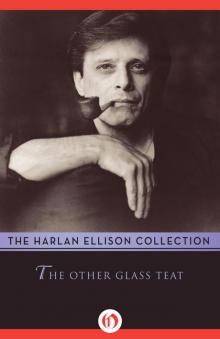 Other Glass Teat
Other Glass Teat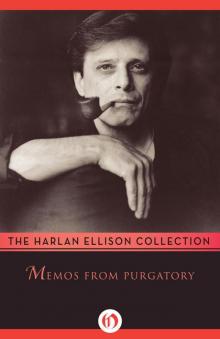 Memos From Purgatory
Memos From Purgatory I Have No Mouth and I Must Scream
I Have No Mouth and I Must Scream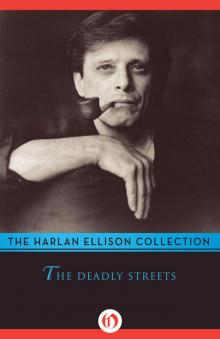 The Deadly Streets
The Deadly Streets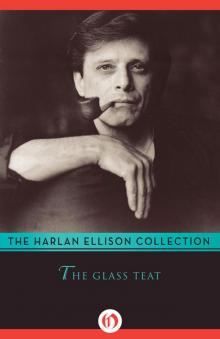 The Glass Teat
The Glass Teat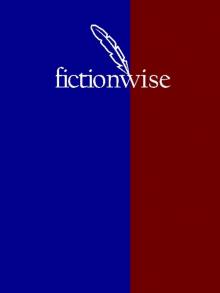 Paingod and Other Delusions
Paingod and Other Delusions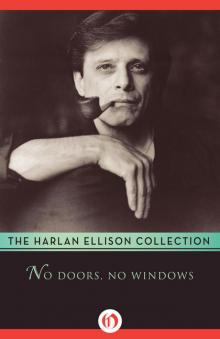 No Doors No Windows
No Doors No Windows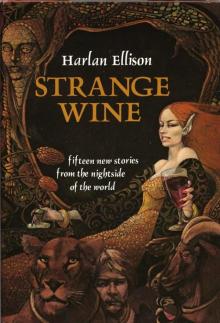 Strange Wine
Strange Wine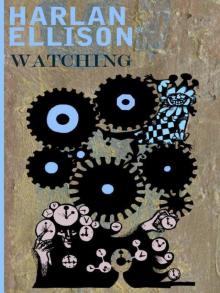 Harlan Ellison's Watching
Harlan Ellison's Watching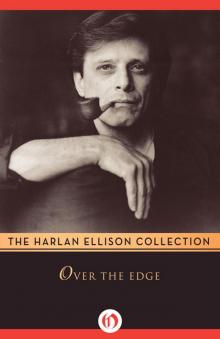 Over the Edge/An Edge in My Voice
Over the Edge/An Edge in My Voice Troublemakers: Stories by Harlan Ellison
Troublemakers: Stories by Harlan Ellison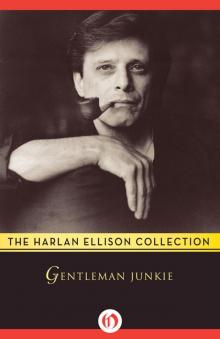 Gentleman Junkie and Other Stories of the Hung-Up Generation
Gentleman Junkie and Other Stories of the Hung-Up Generation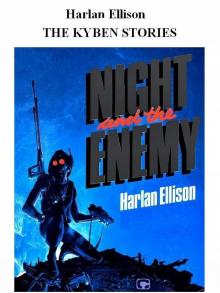 The Kyben Stories
The Kyben Stories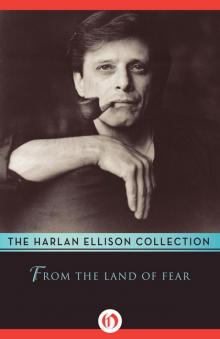 From the Land of Fear
From the Land of Fear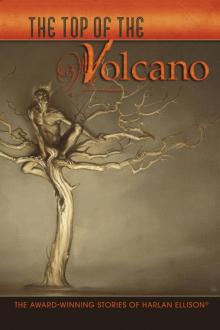 The Top of the Volcano: The Award-Winning Stories of Harlan Ellison
The Top of the Volcano: The Award-Winning Stories of Harlan Ellison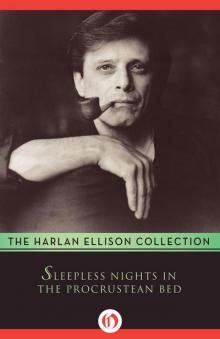 Sleepless Nights in the Procrustean Bed
Sleepless Nights in the Procrustean Bed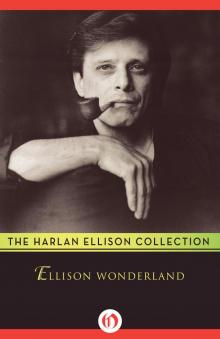 Ellison Wonderland
Ellison Wonderland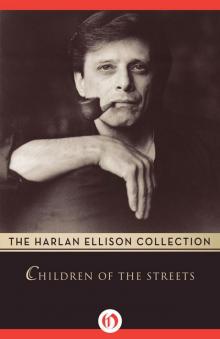 Children of the Streets
Children of the Streets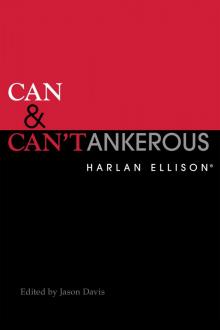 Can & Can'tankerous
Can & Can'tankerous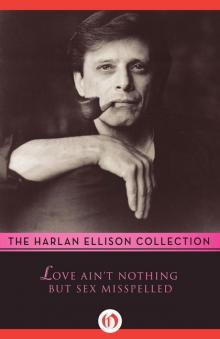 Love Ain't Nothing but Sex Misspelled
Love Ain't Nothing but Sex Misspelled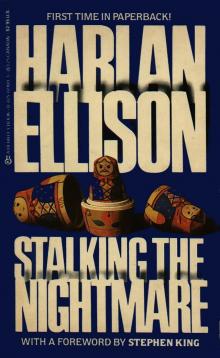 Stalking the Nightmare
Stalking the Nightmare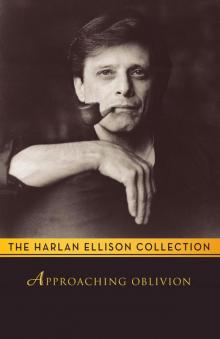 Approaching Oblivion
Approaching Oblivion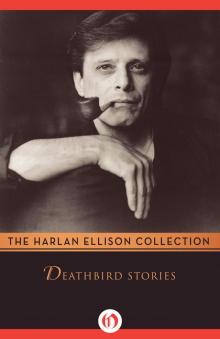 Deathbird Stories
Deathbird Stories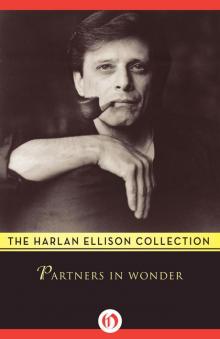 Partners in Wonder
Partners in Wonder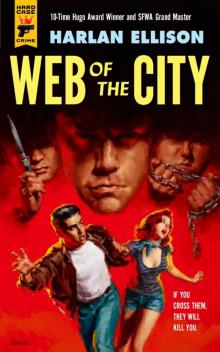 Web of the City
Web of the City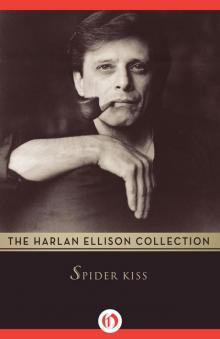 Spider Kiss
Spider Kiss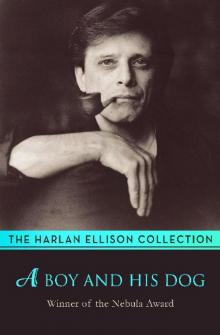 A Boy and His Dog
A Boy and His Dog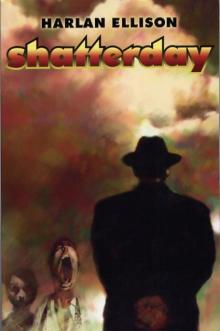 Shatterday
Shatterday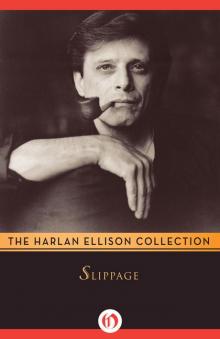 Slippage: Previously Uncollected, Precariously Poised Stories
Slippage: Previously Uncollected, Precariously Poised Stories Repent, Harlequin! Said the Ticktockman
Repent, Harlequin! Said the Ticktockman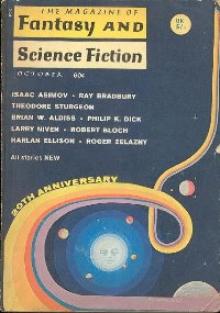 Come to Me Not in Winter's White
Come to Me Not in Winter's White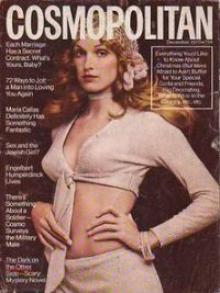 The Song the Zombie Sang
The Song the Zombie Sang The Other Glass Teat
The Other Glass Teat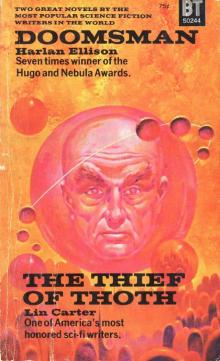 Doomsman - the Theif of Thoth
Doomsman - the Theif of Thoth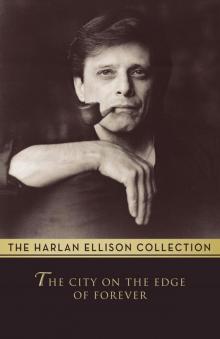 The City on the Edge of Forever
The City on the Edge of Forever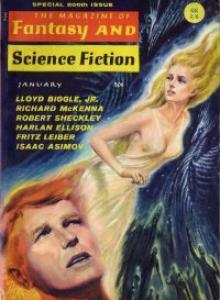 I See a Man Sitting on a Chair, and the Chair Is Biting His Leg
I See a Man Sitting on a Chair, and the Chair Is Biting His Leg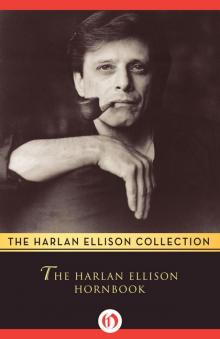 The Harlan Ellison Hornbook
The Harlan Ellison Hornbook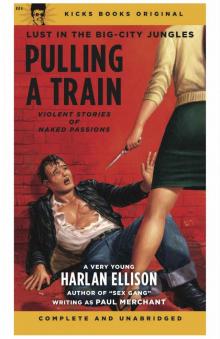 Pulling A Train
Pulling A Train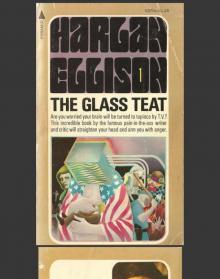 The Glass Teat - essays of opinion on the subject of television
The Glass Teat - essays of opinion on the subject of television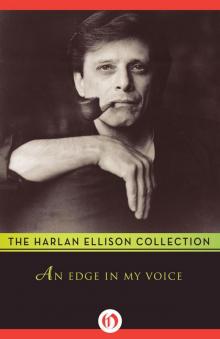 An Edge in My Voice
An Edge in My Voice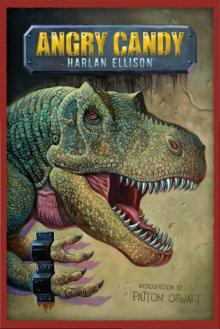 Angry Candy
Angry Candy Troublemakers
Troublemakers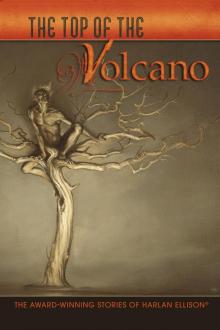 The Top of the Volcano
The Top of the Volcano Over the Edge
Over the Edge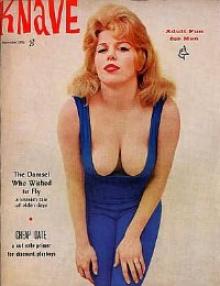 Survivor #1
Survivor #1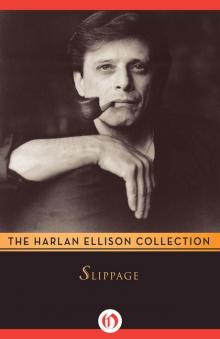 Slippage
Slippage